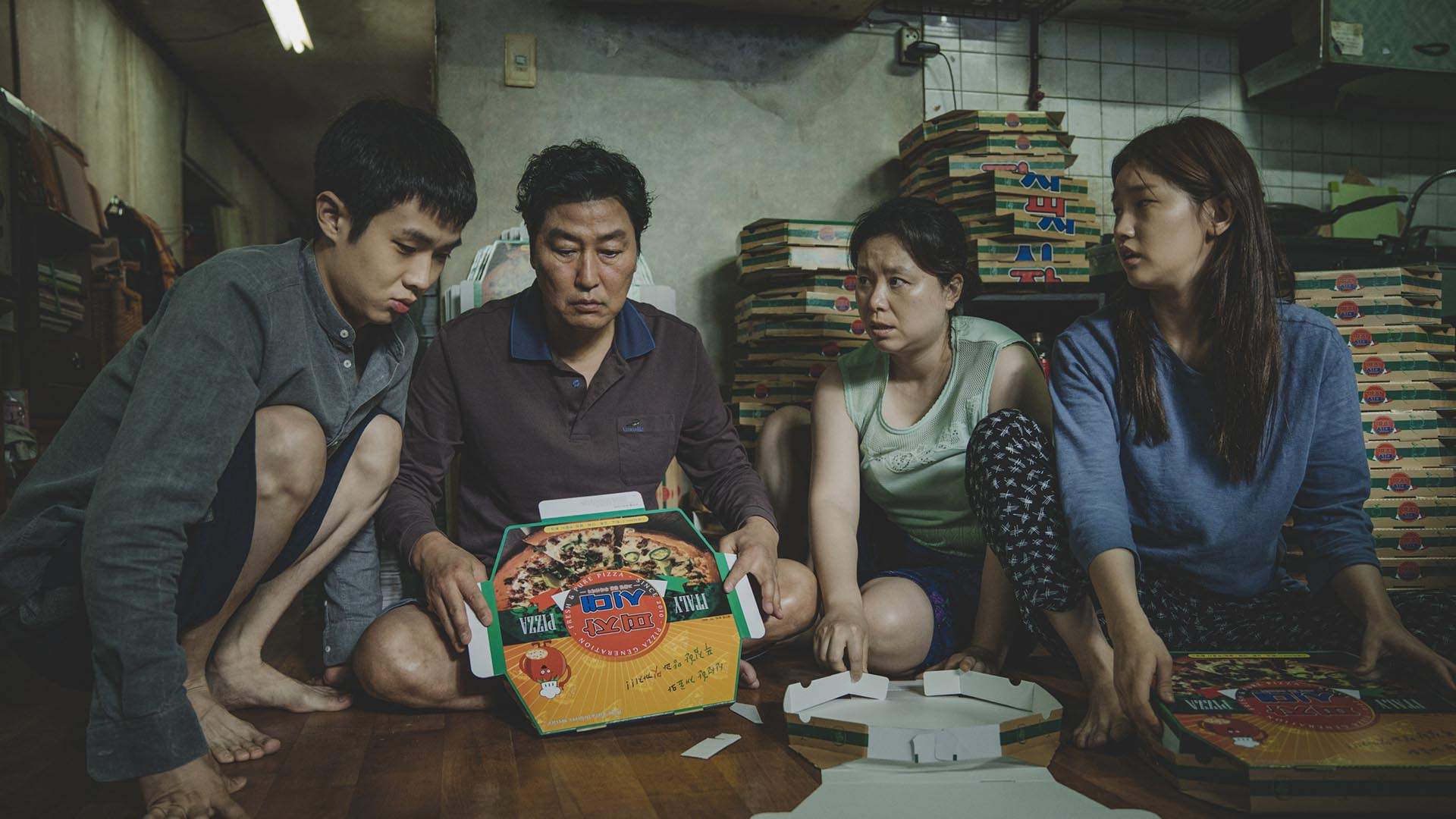Parasite
Bong Joon-ho's 2019 Palme d'Or-winner is an astute, intoxicating masterpiece.
Overview
UPDATE: October 2, 2020: Parasite is available to stream via Neon, Google Play, YouTube Movies and iTunes.
When writer-director Bong Joon-ho lets two families roam around and unleash their best and worst in an opulent South Korean mansion, he couldn't have placed them in a better spot. The kind of house that anyone would dream of living in, Parasite's main setting is a multi-storey playground filled with wide-open spaces, gleaming surfaces and modernist decor, all opening out onto a grassy, leafy backyard. A real estate agent's fantasy as well, this not-so-humble abode is the bricks-and-mortar pinnacle of success and wealth. As created by production designer Lee Ha-jun to meet Bong's specific vision (a real house that matched the filmmaker's needs simply didn't exist), the labyrinthine structure is a puzzle box, too. Within its walls, mysteries linger. Here, anything and everything could happen. Parasite proves exceptional in every single frame and detail that it flicks onto the screen — but the way that this sprawling central home encapsulates the movie's very essence is a towering feat.
Already lauded and applauded, not to mention awarded the top prizes at both the Cannes and Sydney film festivals, Parasite isn't short on achievements. Internationally renowned and beloved as the auteur behind The Host, Snowpiercer and Okja, Bong has crafted a bleak, twisty blend of black tragi-comedy, pulsating thrills and socially relevant horror — a movie that's such a phenomenal example of all that cinema can and should be that you'll want to high-five the filmmaker after watching it. Parasite possesses a pitch-perfect cast of both veteran and up-and-coming actors, all playing their parts with devastating precision. It's scripted, with Okja assistant director turned first-time co-writer Han Jin-won, to tease, mesmerise, infuriate, satirise and amuse in equal measures. And its look and pace, courtesy of the finessed work of cinematographer Hong Kyung-pyo (Bong's Mother) and editor Yang Jin-mo (Bong's Okja), is as polished and probing as its all-important setting.
When viewers first meet Ki-taek (Song Kang-ho), his wife Chung-sook (Chang Hyae-jin), and their young but grown-up children Ki-woo (Choi Woo-shik) and Ki-jung (Park So-dam), they're dwelling in a damp, cockroach-infested basement apartment. They're also all out of work. Piggybacking whichever unlocked wi-fi network they can find keeps them going — and, when the streets outside are being fumigated, the family isn't opposed to keeping the windows open to take advantage of the free pest control (health consequences be damned). Combined, their only regular source of income comes from folding pizza boxes, with zero other prospects on the horizon. Then Ki-woo's former classmate Min (Park Seo-joon) asks if he'll fill in at a lucrative private tutoring gig. While Ki-woo doesn't have the requisite university degree such a position usually needs, it's easy to manufacture thanks to Ki-jung's impressive photoshop skills.
Taking plenty of cues from this early bit of subterfuge, Parasite could be dubbed the ultimate 'fake it till you make it' movie. Stepping foot inside the film's main setting, Ki-Woo wows not only his new, quickly love-struck teenage pupil Da-hye (Jung Ziso), but her flighty mother Yeon-kyo (Cho Yeo-jeong) too. He's soon part of the household, which also includes tech entrepreneur patriarch Park (Lee Sun-kyun), pre-adolescent son Da-song (Jung Hyeon-jun) and their housekeeper (Lee Jeong-eun). With Ki-woo eager to bring his own family into this rich, luxurious orbit, an underhanded plan emerges.
Without spoiling any specifics from this narrative juncture onwards, Bong was inspired to write Parasite after spotting a smudge on his pants. This intriguing tidbit gives very little away, although corrupting an otherwise pristine environment — and pondering whether a splatter of disarray makes supposed perfection and privilege better or worse — is the film's thematic stomping ground. The movie's lush locale draws viewers in, all so that it can shatter the allure. Slippery performances, with seemingly clear-cut characters becoming anything but, do the same. So too does Bong and his crew's exacting craftsmanship, which keeps audiences both immersed and guessing. Add shifting tones and changing genres to the fold as well, because evolution and elusiveness are among the movie's most crucial tools. Indeed, from sets and actors to framing and mood, every element of Parasite is weaponised. More than that, it's all calibrated and wielded for maximum impact.
This isn't just a killer picture on all of the standard levels, however. Contemplating society's growing class collisions and inequities, Parasite also makes a killer statement. It shouldn't escape attention that three of the past year's absolute best and most astute works, all from South Korean or Japanese filmmakers, have taken aim at the increasing gap between the haves and the have nots. Or, looking to America as well, that one of 2019's great horror releases plays in the same terrain while also bringing race into the equation. Parasite shares its grifting, struggling family with Hirokazu Kore-eda's Shoplifters, its tonal flips and wiliness with Lee Chang-dong's Burning, and its malevolent tone with Jordan Peele's Us, adding to a blossoming field of urgent, intense and diverse cinema that interrogates the societal status quo with a rightfully scathing eye. That said, there's no mistaking Bong's dark, devious and delightful thriller for any other film — or for anything but a hands-down masterpiece.





